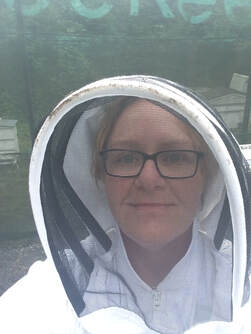
Dr Elizabeth Duncan
Group Leader and Associate Professor of Zoology, School of Biology.
Liz completed her PhD at the University of Otago in sheep genetics before moving to the lab of Professor Peter Dearden and totally changing fields to work on insect evolution, developmental biology and genome evolution. Liz is fascinated by how some animals have the ability to change their physiology, reproduction and behaviour in response to an environmental cue; a phenomenon known as phenotypic plasticity.
Liz moved to the University of Leeds in 2015 to take up a lectureship in zoology and her research programme at Leeds is focussed on understanding how phenotypic plasticity works, how and environmentally responsive reproduction in insects and the evolution of novel life- history strategies like eusociality and asexual reproduction.
In her spare time Liz enjoys walking and learning about UK animals.
Group Leader and Associate Professor of Zoology, School of Biology.
Liz completed her PhD at the University of Otago in sheep genetics before moving to the lab of Professor Peter Dearden and totally changing fields to work on insect evolution, developmental biology and genome evolution. Liz is fascinated by how some animals have the ability to change their physiology, reproduction and behaviour in response to an environmental cue; a phenomenon known as phenotypic plasticity.
Liz moved to the University of Leeds in 2015 to take up a lectureship in zoology and her research programme at Leeds is focussed on understanding how phenotypic plasticity works, how and environmentally responsive reproduction in insects and the evolution of novel life- history strategies like eusociality and asexual reproduction.
In her spare time Liz enjoys walking and learning about UK animals.
Lab members
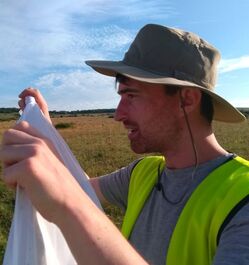
Dr Tom Dally
Research Fellow in Aeroecology
Tom is a Research Fellow on the BioDAR project and works with Dr Ryan Neely (School of Earth and Environment and National Centre for Atmospheric Research), Dr Chris Hassall (School of Biology), Professor William Kunin (School of Biology) and Dr Elizabeth Duncan (School of Biology).
Tom completed his PhD with Prof. William Kunin in 2020, focusing on the development and standardisation of survey methods to monitor insect pollinator populations.
Tom is now working on the BioDAR project, exploring how we can use the UK’s weather radar system to monitor aerial insect biodiversity at a national scale. Tom’s work in the Duncan lab involves using metabarcoding to assess the biological diversity of insect specimens collected in our field samples.
Research Fellow in Aeroecology
Tom is a Research Fellow on the BioDAR project and works with Dr Ryan Neely (School of Earth and Environment and National Centre for Atmospheric Research), Dr Chris Hassall (School of Biology), Professor William Kunin (School of Biology) and Dr Elizabeth Duncan (School of Biology).
Tom completed his PhD with Prof. William Kunin in 2020, focusing on the development and standardisation of survey methods to monitor insect pollinator populations.
Tom is now working on the BioDAR project, exploring how we can use the UK’s weather radar system to monitor aerial insect biodiversity at a national scale. Tom’s work in the Duncan lab involves using metabarcoding to assess the biological diversity of insect specimens collected in our field samples.
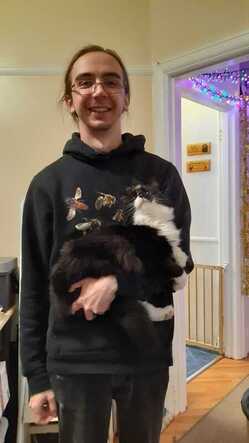
Anthony Bracuti
PhD researcher (NERC Panorama DTP)
Anthony completed his Masters degree in biochemistry at the University of Sussex in 2019. Having always been interested in investigating eusocial insects from a biochemical perspective, he joined the Duncan lab in 2020.
Anthony’s PhD is looking at pheromonal communication in eusocial insects. Of particular interest is the role of pheromonal communication in reproductive constraint, paying special attention to compounds produced by queens and brood.
PhD researcher (NERC Panorama DTP)
Anthony completed his Masters degree in biochemistry at the University of Sussex in 2019. Having always been interested in investigating eusocial insects from a biochemical perspective, he joined the Duncan lab in 2020.
Anthony’s PhD is looking at pheromonal communication in eusocial insects. Of particular interest is the role of pheromonal communication in reproductive constraint, paying special attention to compounds produced by queens and brood.
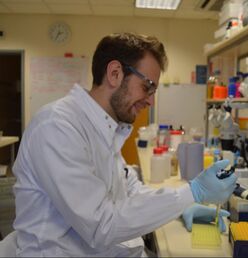
Jens van Eeckhoven
Visiting Researcher
Jens completed his PhD in the Duncan lab in 2020. He used the solitary red mason bee (Osmia bicornis) in a cross-species comparison with the eusocial honeybee to investigate how mechanisms involved in reproductive constraint in the eusocial honeybee may have evolved.
Jens' broader interests lie in evolutionary biology and include: the major transitions in evolution (e.g. the evolution of eusociality), phenotypic plasticity, and sexual selection.
He is currently looking to continue researching eusocial evolution, mainly within the Hymenoptera, with a further interest in developing competency in mathematical modelling
Visiting Researcher
Jens completed his PhD in the Duncan lab in 2020. He used the solitary red mason bee (Osmia bicornis) in a cross-species comparison with the eusocial honeybee to investigate how mechanisms involved in reproductive constraint in the eusocial honeybee may have evolved.
Jens' broader interests lie in evolutionary biology and include: the major transitions in evolution (e.g. the evolution of eusociality), phenotypic plasticity, and sexual selection.
He is currently looking to continue researching eusocial evolution, mainly within the Hymenoptera, with a further interest in developing competency in mathematical modelling
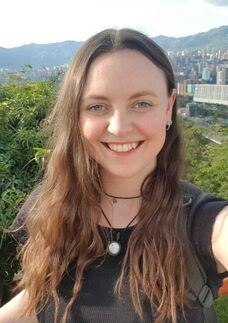
Rosie Knapp
PhD researcher
Rosie completed her masters project in the Duncan lab in 2017, during which she investigated the plasticity of mating behaviours in response to mating competition in the solitary red mason bee, Osmia bicornis.
She is now undertaking a PhD in the lab and is researching the role played by dopamine signalling in controlling worker reproduction and behaviour in honeybee Apis mellifera colonies. Broadly, her research interests include understanding the underpinnings of behavioural and physiological plasticity and eusociality.
PhD researcher
Rosie completed her masters project in the Duncan lab in 2017, during which she investigated the plasticity of mating behaviours in response to mating competition in the solitary red mason bee, Osmia bicornis.
She is now undertaking a PhD in the lab and is researching the role played by dopamine signalling in controlling worker reproduction and behaviour in honeybee Apis mellifera colonies. Broadly, her research interests include understanding the underpinnings of behavioural and physiological plasticity and eusociality.
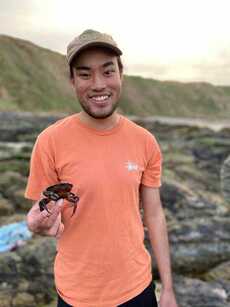
Kane Yoon
PhD researcher (BBSRC White Rose DTP)
My work focuses on the potential role of DNA methylation (an epigenetic mark) in insect polyphenisms (extreme examples of phenotypic plasticity). Polyphenisms involve two or more drastically different forms that an individual can take on, that aren't dependent on different DNA, meaning that genetically identical individuals can take on different forms, or that a single genome has the capacity to produce individuals with big phenotypic differences. Examples include queen and worker honeybees, and solitary and gregarious locusts. I work with the pea aphid as a model aphid species. Aphids are hemipteran insects, in which the role of DNA methylation isn't entirely clear. Aphids reproduce asexually for most of the year to produce genetic clones, but switch to producing sexual offspring in the winter. This is a reproductive polyphenism. There is some evidence to suggest DNA methylation may play a role in polyphenisms, and the pea aphid presents a good opportunity to explore this.
PhD researcher (BBSRC White Rose DTP)
My work focuses on the potential role of DNA methylation (an epigenetic mark) in insect polyphenisms (extreme examples of phenotypic plasticity). Polyphenisms involve two or more drastically different forms that an individual can take on, that aren't dependent on different DNA, meaning that genetically identical individuals can take on different forms, or that a single genome has the capacity to produce individuals with big phenotypic differences. Examples include queen and worker honeybees, and solitary and gregarious locusts. I work with the pea aphid as a model aphid species. Aphids are hemipteran insects, in which the role of DNA methylation isn't entirely clear. Aphids reproduce asexually for most of the year to produce genetic clones, but switch to producing sexual offspring in the winter. This is a reproductive polyphenism. There is some evidence to suggest DNA methylation may play a role in polyphenisms, and the pea aphid presents a good opportunity to explore this.
Alumni
Mackenzie Lovegrove
Mackenzie did her PhD at the The Laboratory For Evolution and Development in Dunedin, New Zealand with Professor Peter Dearden. Mackenzie was co-supervised by Dr Elizabeth Duncan and spent three months at the University of Leeds in 2018. Mackenzie is currently a postdoctoral fellow at La Trobe University in Australia.
Mackenzie did her PhD at the The Laboratory For Evolution and Development in Dunedin, New Zealand with Professor Peter Dearden. Mackenzie was co-supervised by Dr Elizabeth Duncan and spent three months at the University of Leeds in 2018. Mackenzie is currently a postdoctoral fellow at La Trobe University in Australia.
Milo Phillips
Milo was a research assistant in the Duncan lab in 2019, he is now an Assistant Curator of Entomology at Leeds Museum.
Milo was a research assistant in the Duncan lab in 2019, he is now an Assistant Curator of Entomology at Leeds Museum.
Dr Victoria Norman
Victoria was a research fellow in the Duncan lab 2018-2019, she now works at Oxitech Ltd.
Victoria was a research fellow in the Duncan lab 2018-2019, she now works at Oxitech Ltd.
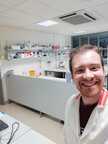
Dr James Rouse
James was a Research Fellow in the Duncan lab from March 2020 - March 2021. James completed his PhD in the lab of Dr Amanda Bretman (University of Leeds) in 2016 studying how genetic and neural mechanisms act to control fruit fly behaviour. He further developed the research between 2016-2020 to address the role of the epigenome in controlling behavioural plasticity in the fruit fly. In March 2020, James joined the Duncan lab working on how the epigenome controls honeybee reproductive plasticity. On a wider scale, James’ research focusses on the genetic (and epigenetic) underpinnings of behaviour, ageing, and the evolution of cognition.
James was a Research Fellow in the Duncan lab from March 2020 - March 2021. James completed his PhD in the lab of Dr Amanda Bretman (University of Leeds) in 2016 studying how genetic and neural mechanisms act to control fruit fly behaviour. He further developed the research between 2016-2020 to address the role of the epigenome in controlling behavioural plasticity in the fruit fly. In March 2020, James joined the Duncan lab working on how the epigenome controls honeybee reproductive plasticity. On a wider scale, James’ research focusses on the genetic (and epigenetic) underpinnings of behaviour, ageing, and the evolution of cognition.
Masters students
- Benjamin Hartley (2020-current, Mbiol)
- Olivia Lambe (2020-current, Mbiol)
- Sean Nolan (2020-current, MBiol)
- Ellen Gravener (2021, Biodiversity and Conservation MSc) "Exploring the potential of environmental DNA to supplement traditional
monitoring methods for pollinator species." - Emily Ross (2021, Biodiversity and Conservation MSc) "The Sublethal Effects of the Neonicotinoid Imidacloprid in Combination with Queen Mandibular Pheromone on Retinue Response and Ovary Activation in Adult European Honeybee Workers, Apis mellifera mellifera."
- Jessica Bouwer (2021, Biodiversity and Conservation MSc) "The influence of queen mandibular pheromone on neonicotinoid induced sublethal behavioural changes in the European honeybee, Apis mellifera mellifera"
- Kieran Howarth (2021, MBioscience) "Elucidating the Molecular Function of PMP34"
- Tesni Houlston (2019-current, MBiol) "Investigating the Effects of Age on Honeybee (Apis mellifera) Magnetoreception"
- Stephanie Williams (2018/20, MBiol) "Investigation into the expression and role of Dnmt3 in the pea aphid, Acyrthosiphon pisum, during asexual development"
- George Seddon-Roberts (2018/20, MBiol) "Comparative transcriptome analysis reveals potential ancestral cell lines of the Acyrthosiphon pisum bacteriocyte."
- Kelly Park (2019, Biodiversity and Conservation MSc) "The sublethal effects of field-realistic concentrations of imidacloprid on the retinue response and ovary activity of European honey bee Apis Mellifera workers"
- Sarah Lonsdale (2019, Biodiversity and Conservation MSc) "Effects of Imidacloprid on Apis mellifera mellifera Behaviour: Causes of Pollinator Population Decline"
- Lois Gaden (2017/19, MBiol) "Do receptor tyrosine kinases control the reproduction-longevity trade-off in the solitary fruit fly, Drosophila melanogaster?"
- Vanessa Barlow (2018, Biodiversity and Conservation MSc) "Using microsatellite markers to investigate the mating system of the solitary bee Osmia bicornis"
- Emily Birch (2016/18, MBiol) "Effects of dietary dopamine and sublethal imidacloprid exposure on the ability of honey bee (Apis mellifera) workers to carry out tasks associated with hive duties"
- Flora Whiting-Fawcett (2016/18, MBiol) "A comparison of the effects of dopamine and imidacloprid in honey bee (Apis mellifera M.) colony harmony"
- Rosemary Knapp (2016/17, MBiol) "Do males of the red mason bee Osmia bicornis (Hymenoptera: Megachilidae) show plastic behavioural responses to the level of reproductive competition?"
